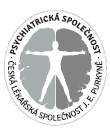Česká a slovenská psychiatrie

Časopis
Psychiatrické společnosti ČLS JEP
a Psychiatrickej spoločnosti SLS
kongresy, konference, kursy
ZPRÁVA Z VĚDECKÉHO SETKÁNÍ NA TÉMA EXPANDING COMPASSION: REFLECTIONS ON OUR RESEARCH, PRACTICE, AND LIVES
3.-5. 4. 2019, State College, Pensylvánie, USA
The 2019 "Compassion Week" events hosted by the Edna Bennett Pierce Prevention Research Center at the Pennsylvania State University focused on the latest mental health research using evidence-based practices of mindfulness and compassion. Sona Dimidjian, professor in the Department of Psychology and Neuroscience at the University of Colorado Boulder was the keynote speaker at this annual event. Dimidjian´s state-of-art lecture "Expanding Compassion: Reflections on Our Research, Practice, and Lives" focused on the challenging aspects of our fast-paced society for women, children, and youth. Mental health issues are rising, people in need do not receive quality services, and many current interventions do not provide lasting benefits. In discussing her research of compassion and caring aimed at helping individuals navigate these societal challenges, Dimidjian identified three key ingredients to meaningful academic and mental health profession work. These three strands relate to the processes of 1. Partnering, 2. Bridging, and 3. Pausing as a comprehensive approach to promoting individual and societal health. In Dimidjian´s work, these three aspects are interconnected and she presented them in connection to various research studies she has conducted.
The "Partnering" aspect of research and practice lies in creating meaningful partnerships as a way to increase the quality of intervention science work. Dimidjian highlighted the value of adversarial collaboration - partnerships among people who have competing perspectives and hypotheses along with different expertise. In an intervention study of compassionate response in the face of adversity, Dimidjian collaborated with experts of placebo effect to examine the effects of regular use of compassion audio exercises. The results showed that, compared to the placebo effect, participants who listened to recordings of compassion exercises were more willing to help people in need through real-money charitable donation (Ashar et al., 2016). These results suggest that deliberate practice of compassion can cultivate real-life helping behaviors above and beyond the placebo effect, providing critical insights into compassion research, which was made possible through partnering.
The term "Bridging" refers to applying our research to the communities and increasing access of care. In India, Dimidjian collaborated on a study of "Task sharing" using a peer support model in the community to help pregnant women prevent depression relapse (Patel et al., 2017). Adapting this peer support model, her team also developed "Healthy activity program" for pregnant woman in a rural, Spanish speaking community in the US, where access to mental health care is limited. The unique strength of this program is the critical role of peer community leaders who actively participate in helping pregnant woman develop skills to prevent depression. Dimidjian also discussed the "co-creation" approach, where an intervention is fundamentally grounded on the partnership among key stakeholders from its very conception. One example of this is the "Healthy Body, Mind, and Voice" project, where a group of researchers, professions, and particularly youth leaders met periodically to create and adapt an eating-disorder intervention for adolescent teens. This interactive process led to a well-rounded, evidence-informed and culturally-sensitive program that is currently being tested.
Finally, the strand of Pausing shed light on the need to pause and reflect not only on what we do but also on how we do our work and whether this is aligned with the fundamental aim of our work - promoting wellbeing and mental health in the world. Dimidjian shared about her interaction with the Dalai Lama in their recent meeting, in which he reminded her of an old wisdom. To positively influence 100,000 people, we need to start with just 1 person. From 1 person we can impact 10 people, from 10 people to a hundred, from a hundred to a thousand, and from a thousand to ten thousand of people. This incremental approach begins with one person and that one person is us. Cultivating open-mindedness and willingness to be proven wrong, together with a creative endeavor to bridge important gaps in mental health care starts with us. Dimidjian invites everyone in the helping profession - researchers, academics, mental health professionals - to pause and reflect on this important role we all share: being that one person who can start the positive change.
Ing. Kamila Dvořáková, M.A., Ph.D., výzkumná pracovnice v Národním ústavu duševního zdraví
References:
- Ashar YK, Andrews-Hanna JR, Yarkoni T, Sills J, Halifax J, Dimidjian S, Wager TD. Effects of compassion meditation on a psychological model of charitable donation. Emotion 2016; 16 (5): 691.
- Patel V, Weobong B, Weiss HA, Anand A, Bhat B, Katti B, Vijayakumar L. The Healthy Activity Program (HAP), a lay counsellor-delivered brief psychological treatment for severe depression, in primary care in India: a randomised controlled trial. The Lancet 2017; 389 (10065): 176-185.





